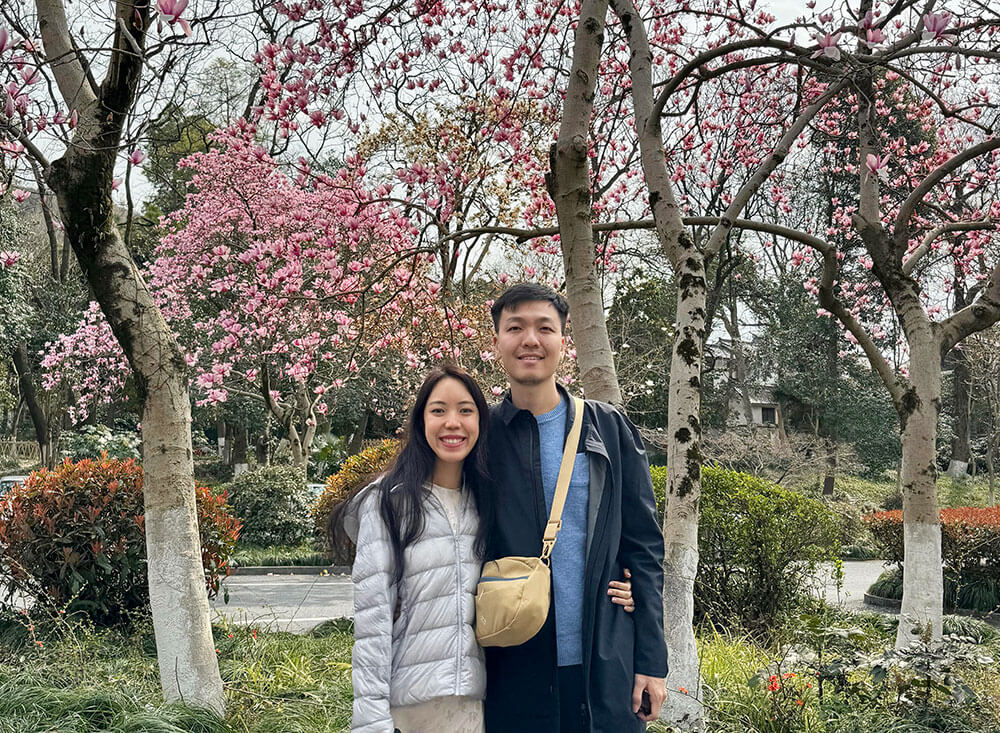Not every love story starts with a dating app and a spontaneous flea market project, but Zhiqun (33) and Jing Lin’s (31) did. What began as a casual collaboration soon grew into a meaningful shared venture—creating a dating platform centred on fostering intentional and authentic connections. As their personal relationship deepened alongside their professional partnership, the couple—now married since 2023 and expecting their first child—knew that marriage wouldn’t be all butterflies and rainbows. So, months before tying the knot, they enrolled in EMCC’s Marriage Preparation Programme (MPP) to lay a strong foundation for their future together. They saw it not just as a course, but as a long-term investment—exactly what a marriage preparation course in Singapore should offer: clarity, communication tools, and emotional grounding.

Why did you decide to go for MPP?
Zhiqun & Jing Lin:
We didn’t want to walk into marriage blindly. We knew that love alone wasn’t enough—relationships need skills too. We were already aware that conflicts are normal and wanted to learn how to handle them healthily. We also felt it was important to gain professional perspectives, not just advice from friends or things we read online. MPP seemed like the perfect place to grow our relationship tools and prepare ourselves better.
What were you struggling with, and how did MPP help?
Zhiqun & Jing Lin:
At the time, wedding prep was one of the biggest sources of tension. It’s a major milestone, and we both had strong opinions. We definitely had a few arguments that escalated.
The course gave us tools to manage that stress. We remember the facilitator explaining how, during conflict, the brain gets hijacked—your prefrontal cortex shuts down, and emotions take over. Being aware of that helped us self-regulate and have clearer, calmer conversations.
It wasn’t just theoretical. We saw real-time conflict role-plays from other couples and how the facilitator guided those conversations with care and accountability. Watching that play out made a deep impact—it showed us what respect, honesty, and resolution could look like in action.
At the time, we were also navigating some trickier conversations around topics like religion, and MPP gave us a safe space to explore those. Even though it was a group setting, we really appreciated being able to stay back after the sessions to ask our facilitator these more personal questions.

What did you take away from the programme?
Zhiqun & Jing Lin:
The sessions left a lasting impression—two years on, we still vividly remember many of the lessons our facilitator shared! The idea that healthy relationships aren’t about perfection—they’re about harmony, disharmony, and repair. Conflict isn’t a sign of failure; it’s an opportunity to understand each other better. We also learnt to use “I” statements and practical tools like conflict resolution models, which we still use today.
The topic on in-laws was particularly relevant, and especially helpful now after we got married. Navigating those relationships can be tricky, but the principles shared helped us align as a team and approach our families with more clarity and unity.
You mentioned that your joint venture, Kopi Date, aims to help couples build more intentional and meaningful connections—has attending MPP influenced how you approach your work on the platform?
Zhiqun & Jing Lin:
Definitely. The programme validated many of our ideas about what makes a relationship thrive. It reminded us that healthy relationships are built—not stumbled into.
We’ve since shifted Kopi Date more intentionally toward helping people foster meaningful, resilient partnerships. We now view dating not as an end in itself but as the starting point of a lifelong journey. Concepts like attachment styles and relational dynamics shaped how we think about relationships—and how we want to support others in building them, too.
What would you tell someone who’s unsure about attending MPP?
Zhiqun & Jing Lin:
We’ve already encouraged some of our friends to attend! We believe MPP isn’t just helpful—it’s essential.
People often think you only need help when things are broken, but we believe the opposite. You go for MPP not because something’s wrong, but because your relationship is worth investing in. If you’re building a future together, why wouldn’t you equip yourselves with the tools to do it well?

